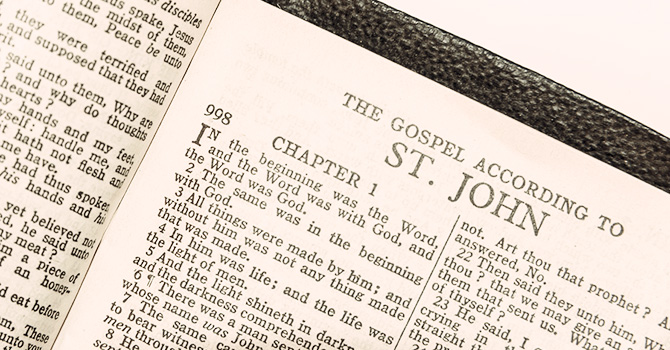Editor’s note: Faith & Leadership offers sermons that shed light on issues of Christian leadership. Ed Moore delivered this sermon on Oct. 25, 2011, at a retreat at Lake Junaluska for Spirited Life, a multi-year health and wellness program and behavioral health study offered by the Duke Clergy Health Initiative.
When you move, you find things. In the summer of 2007, as Mary and I were unpacking at our new home in North Carolina, I came across a box filled with cards and letters I’d received when leaving a congregation to move on to the next appointment. Some were heartfelt goodbyes, wishing me well in the next place of service; others were thinly disguised “thank-God-you’re-moving” kinds of things. Then there was one that was very different.
It was handwritten, came in a basic, white envelope, from a 30-something young woman, highly educated, and it began like this: “Dear Ed, Of all the things for which I need to thank you, first among them is this: You saved my life.”
The writer reminded me of the day she had come into my office and, with clarity and calmness, told me of her intention to take her own life. She had every detail planned: time, place, means of ending it all, letters written to her husband and parents -- everything. The perfect script. She wanted to know if I would still do her funeral if she committed suicide. That was the final bit of planning, you see.
Every competent pastor knows what must be done in a situation like that. We -- the church, medical folk, her family and I -- performed the intervention that was imperative. She recovered from her deep depression. I still get the monthly newsletter from that church; she has been teaching Disciple Bible now for several years. And doing well, thanks be to God.
When she came into my office that day, she brought the valley of the shadow of death along with her, because that is where her soul had already journeyed. As I listened to her describe how she would take her life, I could smell the freshly turned earth from her newly opened grave. She was that far into the valley of shadows. Near the last milepost.
I was able to go in there and take her by the hand because I had been to that same milepost in the valley a few years earlier. I had made similar plans, come calmly and deliberately to the same decisions.
And in that dark place, I had been captured by the grace of God -- a grace incarnate in the lives of folk who cared for me -- and led back out into the light of life. So when that sister came into my office that day, I knew exactly where she was and how to lead her out.
It was not Ed Moore, as her letter suggested, but the grace of God poured out in my life, abundantly and undeservedly, that caught her and saved her. We left that newly opened grave empty on that grace-filled day.
Deep depression takes something out of you. The therapy, the drugs, the difficult journey -- it takes something from you. Struggling out of the valley of shadows, I left some things behind: some intellectual acuity, some vocabulary, a couple of high notes from my spiritual register. I grieved the loss of those parts of myself -- until that day my sister came into the office and cried out from her own graveside.
Then, through the work of the Holy Spirit, I came to understand: it was my own journeying in grief that had prepared me to go in there and offer her the path to redemption. My grief turned out to be a gift for ministry.
I shudder to think what stock textbook answer I might have given her that day, what intellectually impeccable logic I might have flung her way, had I not traveled my own journey into the valley of shadows. I might have ended up presiding at the funeral she requested. And I would have done it with liturgical precision and professional finesse! My, the compliments that would have come my way at the coffee hour after we had laid her in the ground!
But, thanks be to God, I had myself been deep into the valley of shadows.
Every pastor knows that you can read a passage of Scripture 100 times, then next time you turn to it, the Spirit shows you something you had never seen before. When I rediscovered that letter from my former parishioner, my Bible lay open on my desk, turned to Genesis 12, the story of God’s call to Abraham and Sarah.
I saw at once, and for the first time, that God asked Abraham and Sarah to lose parts of themselves before they could begin the covenant journey: their homeland, their clan connection, which meant everything in that culture. I saw, for the first time, that they began the covenant journey in grief, in loss, and that that grieving, that loss began the highway to the new Jerusalem.
When we come to the story of Mary Magdalene encountering the risen Christ in what Pilate thought was a cemetery, we view that scene through lenses that prejudice the text. Charles Wesley’s resurrection hymn is already sounding through our souls: “Christ the Lord is risen today, Hallelujah!”
But what the text says is that Mary -- once her name is spoken by the risen Christ and she knows it is Jesus -- immediately goes to find Peter and the ten, huddled in some spiritual bomb shelter, the lot of them having deserted Jesus of Nazareth!
They had lost everything: the illusion of their own spiritual strength (remember Peter having said so boldly, “I will never deny you!”), their integrity as a spiritual community, their status as disciples. They were gathered, hiding, suffering from profound loss. They were in the midst of grief.
We need to get the Wesley hymn out of our heads and listen to the text. They were grieving, all of them. Deep in the valley of despair. Some of them perhaps contemplating the same act my dear sister did that day she came to see me.
In that valley is where Mary Magdalene comes looking for them, at a milepost way deep in the shadows. Their journey back toward apostleship, toward being the church, begins in grief. Just as did Sarah and Abraham’s journey toward the covenant.
In Herod Antipas’ prison, John the Baptist waited for the executioner’s knock on the door. He sent some of his disciples to Jesus with a desperate question: “Are you the one who is to come, or must we look for another?” Jesus’ reply was simple: “Go and tell John what you have seen and heard: the blind receive their sight, the lame walk, the lepers are cleansed, the deaf hear, the dead are raised, the poor have good news brought to them” (Luke 7:22 NRSV).
Nearing his own last milepost in the valley of shadows, John cried out in anguish and got the word that convinced him there was light and life beyond his present darkness. The answer he got back from Jesus has redeemed millions of women and men across 2,000 years. In answering John’s grief, Jesus laid the foundation stones of his church, against which the gates of death are powerless.
Are you grieving today? Perhaps your grief is fresh, raw, potent. Maybe it has been simmering in your soul a long, long time. Perhaps the force of it has passed, but the scars are suffocating your spirit, keeping you in that bomb shelter where Peter and the others were hiding. Does journeying with that grief keep you from being the person -- the pastor -- you were called to be? Then let me share a letter with you:
“Dear Ed, Of all the things for which I need to thank you, first among them is this: You saved my life.”
Sisters and brothers, it was not I who saved her that day. It was Mary Magdalene, striding into the valley of the shadow of death to knock, once more, on a door and proclaim the good news: “I have seen the Lord” -- the Lord who will not let the grave claim you who are trembling inside the prison of grief or depression.
Grief is one more place on the journey from baptism to the new Jerusalem. Let the one who poured the waters of promise on your head so long ago -- let that one sanctify your grief and turn it into ministry. He has been doing that since the days of Abraham and Sarah. Since the days of Peter, who denied he had ever known Jesus of Nazareth.
That is the good news of the gospel. Thanks be to God. Amen.


















